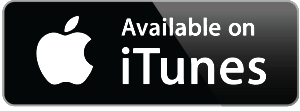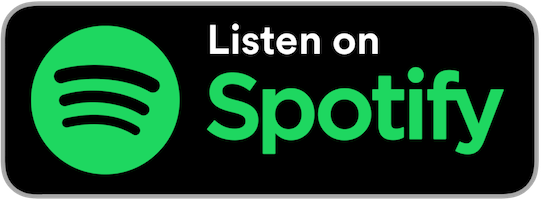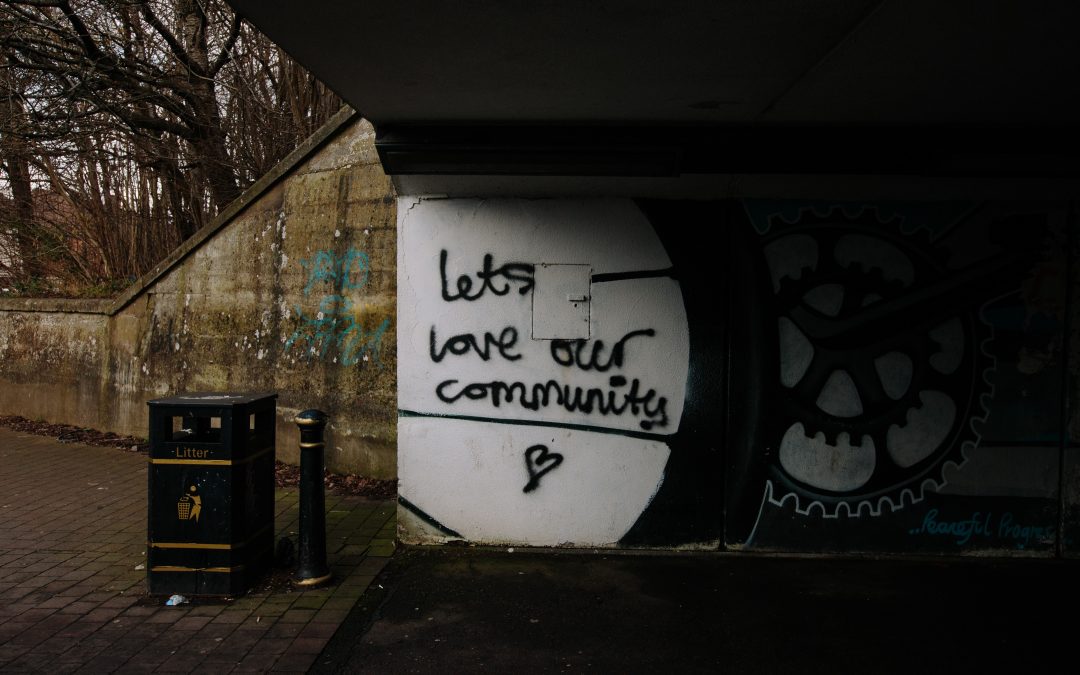
Jason Warner on GitHub and Leadership
GitHub has seen a startling level of growth. With over 31 million developers spread across 96 million repositories, it has become the quite literal hub for how people build technology (and was recently acquired by Microsoft for $7.5 billion). Throughout this remarkable growth, GitHub has continued to evolve as a product and platform, and the fit and finish of a reliable, consistent product has been a staple of GitHub throughout the years.
Jason Warner is SVP of Technology at GitHub and is tasked delivering this engineering consistency. Jason and I used to work on the engineering management team at Canonical before he went to Heroku and then ultimately GitHub.
In this episode of Conversations With Bacon, we get into a truly fascinating discussion about not just how GitHub builds GitHub, but also Jason’s philosophy, experience, and perspective when it comes to effective leadership.
We discuss how GitHub evaluate’s future features, how they gather customer/user feedback, how Jason structures his team and bridges product and engineering, what he believes truly great leadership looks like, and where the future of technology leadership is going.
Since I have started doing Conversations With Bacon, this conversation with Jason is one of my favorites: there is so much in here that I think will be interesting and insightful for you folks. If you are interested in technology and leadership, and especially if you are curious about hot the GitHub machine works, this one is well worth a listen. Enjoy!

Mary Thengvall on Developer Relations, Reporting, and Growth
In recent years, developers have become an increasingly important audience for organizations to build relationships with. Not only are developers actively building technology, but they are also often helping to shape decisions inside of businesses that cover product, awareness, and beyond.
As such, Developer Relations has become an increasing focus for many organizations. How though, do you build real relationships with developers?
Mary Thengvall has been actively involved in Developer Relations for a number of years in her experience at O’Reilly, Chef, Sparkpost, and as an independent consultant. She is the author of The Business Value Of Developer Relations and maintains DevRel Weekly.
In this episode of Conversations With Bacon, we unpick what Developer Relations is, Mary’s ascent in the industry, and how this work can and should be integrated into a business. Mary also shares her perspectives on what success looks like, how technical DevRel people should be, where this work should ideally report, and much more.
A really fascinating discussion and well worth a listen!
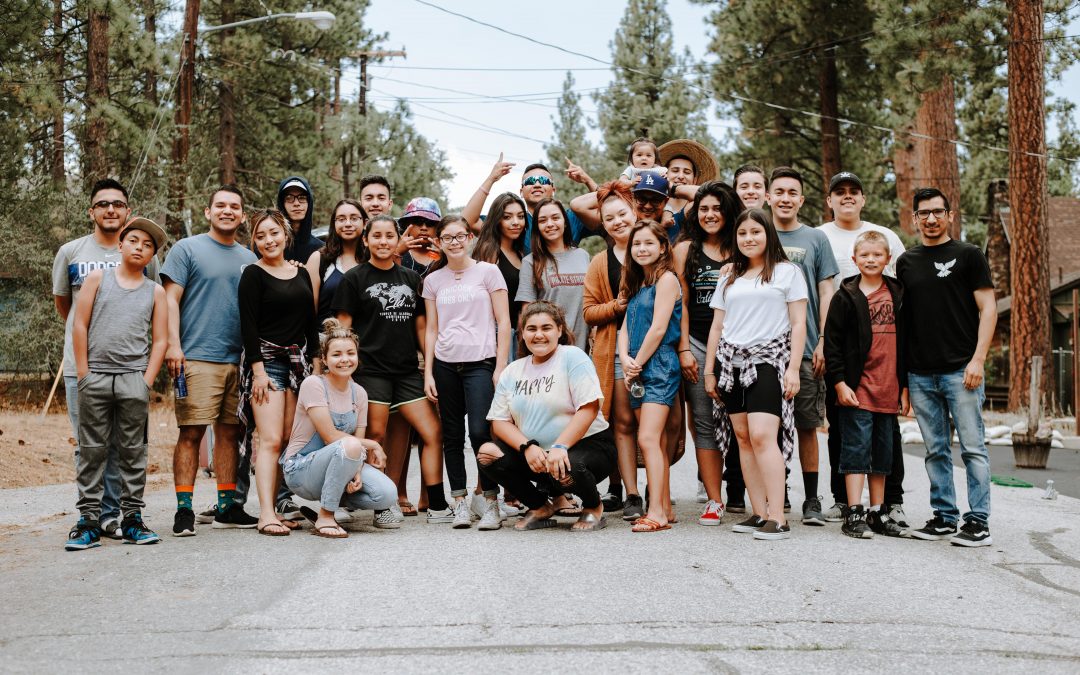
Announcing ‘People Powered’ Bulk Packages (w/ included 1-on-1 Webinars and Directed Learning)
A little while ago I announced my brand new book, ‘People Powered: How communities can supercharge your business, brand, and teams‘ published by HarperCollins Leadership, and released on the 12th November 2019.
At the core of ‘People Powered’ is a pragmatic business book designed to provide (1) an overview of the sheer potential and value of communities for an organization, (2) how to approach building a set of target personas, shaping a community journey, coordinating events, building meaningful incentives and baking all of this into a practical strategic plan, and (3) how to integrate this into a company, track the work well with a set of maturity models, and make consistent improvements.
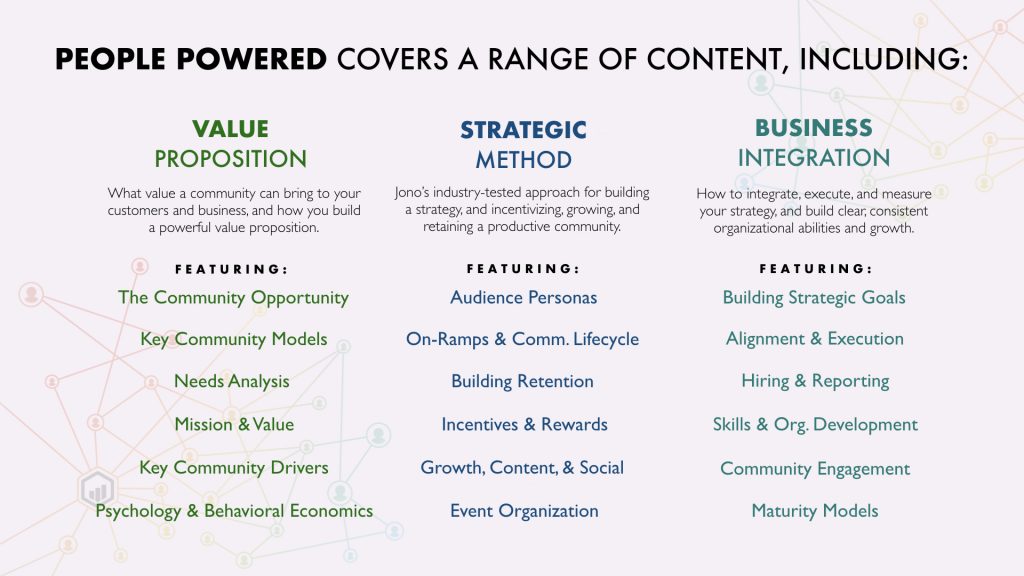
So, here’s the deal.
Many companies run internal directed learning initiatives where they buy books for their employees and then provide webinars and additional learning/materials to support their team reading the book and soaking up the core approaches and principles in it. It is a fantastic way to not just build skills for your organization and team members, but a fun and empowering way to bring team members together, and importantly, to learn together.
Well, unsurprisingly, I want to offer this for ‘People Powered’. This is a book ripe for these kind of learning initiatives: while it provides a high-level overview of the value of community across many industries, the book delves deep into a set of pragmatic approaches, frameworks, and models for building amazing communities.
I want to provide opportunities to deliver this kind of directed learning in a cost-effective way and with hands-on guidance from myself. As such, I excited to share my People Powered Bulk Order Packages.
How they work
In a nutshell, depending on how many copies of ‘People Powered’ you purchase, you will get a significant bulk order discount, all (hardback) copies of the book are personally signed by myself, you will get access to a comprehensive knowledge base, and I will provide direct, 1-on-1 engagement with your organization and team members.
These different perks are included at different levels, depending on the number of copies sold, and I am not charging any extra fees for the hands-on time: it is all included in the package. You only pay for the books.
These bulk orders are entirely customizable too. For example, I just signed an order with a company for 100 copies and I am providing them with an on-site fireside chat at their office in Silicon Valley, and a follow-up discussion after their team has had an opportunity to read the book.
Another company has purchased 500 copies and I am providing a series of webinars where the team can ask questions at different phases of reading ‘People Powered’. For example, the team will read chapters 1 – 3 first and then I will provide a Q&A webinar session. Then, they will read chapters 4 – 6, and I will provide another session, and so on. This provides an opportunity to not just get clarity on the material, but also for me to augment it with additional recommendations and insight.
Take a look at the bulk order packages, and feel free to get in touch if you have questions or want to discuss something more specific for your organization.
How People Powered Can Benefit Your Organization
I am really proud of ‘People Powered’. I believe it provides the most comprehensive, clear, and strategic book available for harnessing the power of great communities for any organization.
The book doesn’t just outline the potential of communities, but it provides a simple to read, yet pragmatic and focused blueprint for building a wide variety of communities, from fans, to support, to engineering, and beyond.
For a more in-depth overview of what is in the book, see the video below:
Also, ‘People Powered’ has received enthusiastic endorsements from a number of leaders in their respective industries:
- Nat Friedman – CEO of GitHub
- Jamie Hyneman – Co-Creator and Host of Mythbusters
- Jamie Smith – Former Deputy Press Secretary for President Barack Obama
- Kevin Scott – CTO of Microsoft
- Villi Iltchev – General Partner of August Capital
- Uttam Tripathi – Head Of Global Programs and DevRel Ecosystem at Google
- Gia Scinto – Head Of Talent at YCombinator
- Jim Whitehurst – CEO of Red Hat
- Ali Velshi – Anchor on MSNBC
- Jim Zemlin – Executive Director of The Linux Foundation
- Whitney Bouck – COO of HelloSign
- Mårten Mickos – CEO of HackerOne
- Juan Olaizola – COO of Santander España
- Jeff Atwood – Co-Founder of Discourse and StackOverflow
- Angela Brown – General Manager of Events at The Linux Foundation
- Dries Buytaert – Founder of Drupal and Acquia
- Paul Salnikow – CEO of The Executive Centre
- Ben Uretsky – Co-Founder of DigitalOcean
- Billy Cina – Co-Founder and CEO of MarketingEnvy
- Maxx Bricklin – Co-Founder of BOLD Capital Partners
- Jose Morales – Head Of Field Operations at Atlassian
- Maria Sipka – Co-Founder of Linqia
- Nithya Ruff – Senior Director of Open Source at Comcast
- Michael Skok – Founding Partner of Underscore.VC
- Giorgio Regni – CTO of Scality
- Tracy Ragan – CEO of DeployHub
- Paul Bunje – Co-Founder of Conservation X Labs
- Ryan Bethencourt – CEO of Wild Earth and Partner at Babel Ventures
Of course, if you have any questions about how can shape your specific internal education initiative, get in touch. Thanks!

Talking About Communities and ‘People Powered’ with Leo Laporte
I have always had a bit of a soft spot for the TWiT team and more specifically Leo Laporte. Years ago I used to co-host FLOSS Weekly on their network and occasionally I pop over to the studio for a natter with Leo.
With ‘People Powered: How communities can supercharge your business, brand, and teams‘ coming out, I thought it would be fun to hop over there. Leo graciously agreed and we recorded an episode of their show, Triangulation.
As usual, it was a fun discussion and we got into a number of topics, including:
- What are communities? Are social media networks communities?
- Why do people form into communities?
- What kind of technology should people use to set up a community?
- How do prevent toxic communities?
- Who the hell turned on that fire down there behind us?
- How should companies handle criticism from a community? Should they censor it?
- What kind of community should TWiT set up?
Click below to watch the show:
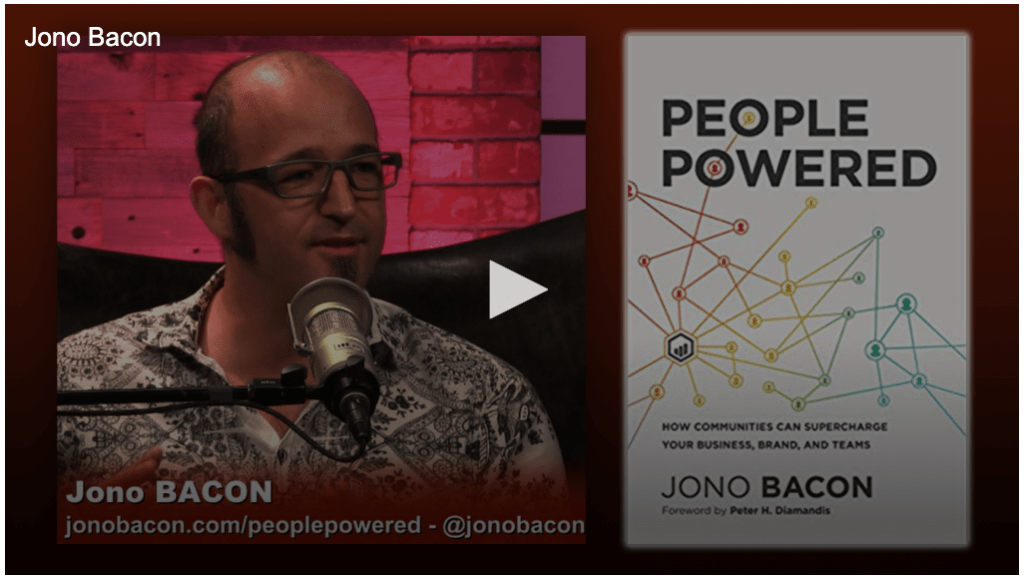

Jeff Atwood on Discourse, Stack Overflow, and Building Online Community Platforms
Building collaborative online platforms is hard. To make a platform that is truly compelling, and rewards the right kind of behavior and teamwork, requires a careful balance of effective design, workflow, and understanding the psychology of how people work together.
Jeff Atwood has an enormous amount of experience doing precisely this. Not only was he the co-founder of Stack Overflow (and later Stack Exchange), but he is also the founder of Discourse, an enormously popular Open Source platform for online discussions.
In this episode of Conversations With Bacon we get into the evolution of online communities, how they have grown, and Jeff’s approach to the design and structure of the systems he has worked on. We delve into Slack vs. forums (and where they are most appropriately used), how Discourse has designed a platform where capabilities are earned, different cultural approaches to communication, and much more.
There is so much insight in this discussion from Jeff, and it is well worth a listen.
Oh, and by the way, Jeff endorsed my new book ‘People Powered: How communities can supercharge your business, brand, and teams’. Be sure to check it out!
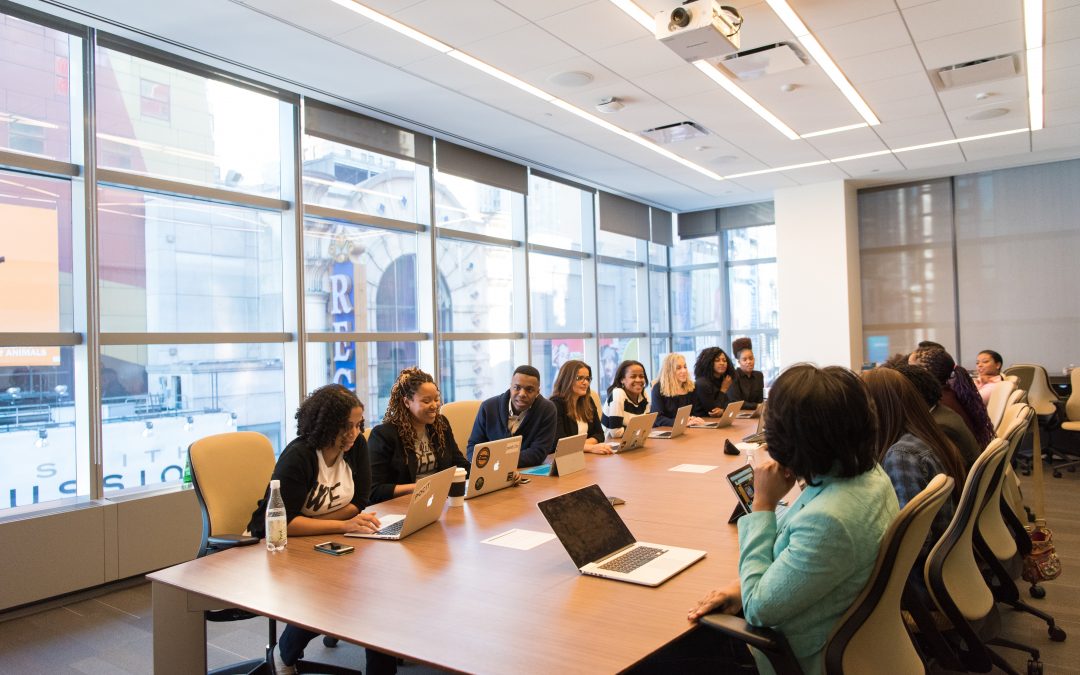
People Powered Voices: Whitney Bouck, COO of HelloSign
A few weeks ago I announced my brand new book, ‘People Powered: How communities can supercharge your business, brand, and teams’, published by HarperCollins Leadership, and available on 12th November 2019.
One of the challenges in writing a book such as ‘People Powered’ is selecting stories, examples, and case studies to include in the book. While I included stories from Joseph Gordon-Levitt, Jim Whitehurst, Ali Velshi, Alexander van Engelen, Jim Zemlin, Peter Diamandis, and others, the world of community building is far more expansive and diverse than these stories alone. There are thousands of examples and learnings out there in incredible communities being built by a broad range of people and backgrounds.
Some of these stories I am featuring on my podcast, Conversations With Bacon (such as Emily Musil Church from XPRIZE and Kate Drane from Techstars), but I also want to share these stories here on my blog too, especially from underrepresented groups across a broad range of industries and experience. There are so many fantastic people out there doing this work and I can use my website and platform to do a better job in helping to share some of these stories.
As such, I am kicking off a series of interviews here on my blog called People Powered Voices. These interviews are designed to augment the stories and examples in the book to provide a more comprehensive set of material for you all to pull from. I am also linking these from the Resources section of my website (which I repeatedly reference in ‘People Powered’ as a source of additional material, templates, and content that expands on the book). This extra material will be available soon.
So, let’s get this party started, and I am really excited about my first interview…
Whitney Bouck, COO of HelloSign
Whitney Bouck is one of the most incredible people I have met in my career. Previously running marketing at EMC and Box, Whit has also advised numerous of companies in her work as an advisor with the YCombinator continuity fund.
I first met Whit at a conference my wife, Erica, and I joined in Hawaii. This conference included a set of attendee-driven discussion sessions where attendees shared their experience on a wide variety of topics related to running businesses.
Whit’s contributions all had a common theme: the importance of unlocking potential in the people inside and outside of a company. As I discovered more about her work, and as we became friends, it has been fascinating to learn about her approach and experience.

Whit is part of the HelloSign leadership team, which is now a part of Dropbox (when they were acquired back in February). HelloSign still runs as a separate business and her role as COO is to oversee the go-to-market functions (sales, marketing, business development, customer support/success) as well as finance, legal and strategic planning functions.
Importantly though, Whit is deeply involved in how the various communities at HelloSign are shaped.
When I think of the HelloSign community, I think of an onion—multiple layers that build on one another to create a whole that is greater than the sum of the parts.
Like many other organizations, HelloSign has focused a chunk of their community strategy in building a community of integration partners. This enables HelloSign to be integrated tightly into the workflow of their customers. This includes integrations with Google Docs, Zapier, Box, Hubspot, Slack, and others.
No software solution is an island…it must connect with and work with the other systems within a company. By building strong relationships and integrations with our partners, we build an ecosystem to support the ways our customers use our solutions. By leveraging this ecosystem, we’re also able to incorporate our customers’ technologies of choice into our solutions, ensuring we’re providing the best value possible to the customer.
These kinds of integration communities can be powerful, but a discussed in ‘People Powered’, I refer to these as a Collaborator model community, of the Outer type. Building these effectively requires a careful balance of targeted personas, clear developer onramps, documentation, and places for developers to get help.
Unsurprisingly, Whit is also passionate about their customer community.
Customers make up a key layer of our HelloSign community. We invest a lot of time in creating spaces for them to come together to share best practices, tips, and tricks as well as learn about new features that allow them to streamline workflows and have a great experience with our products
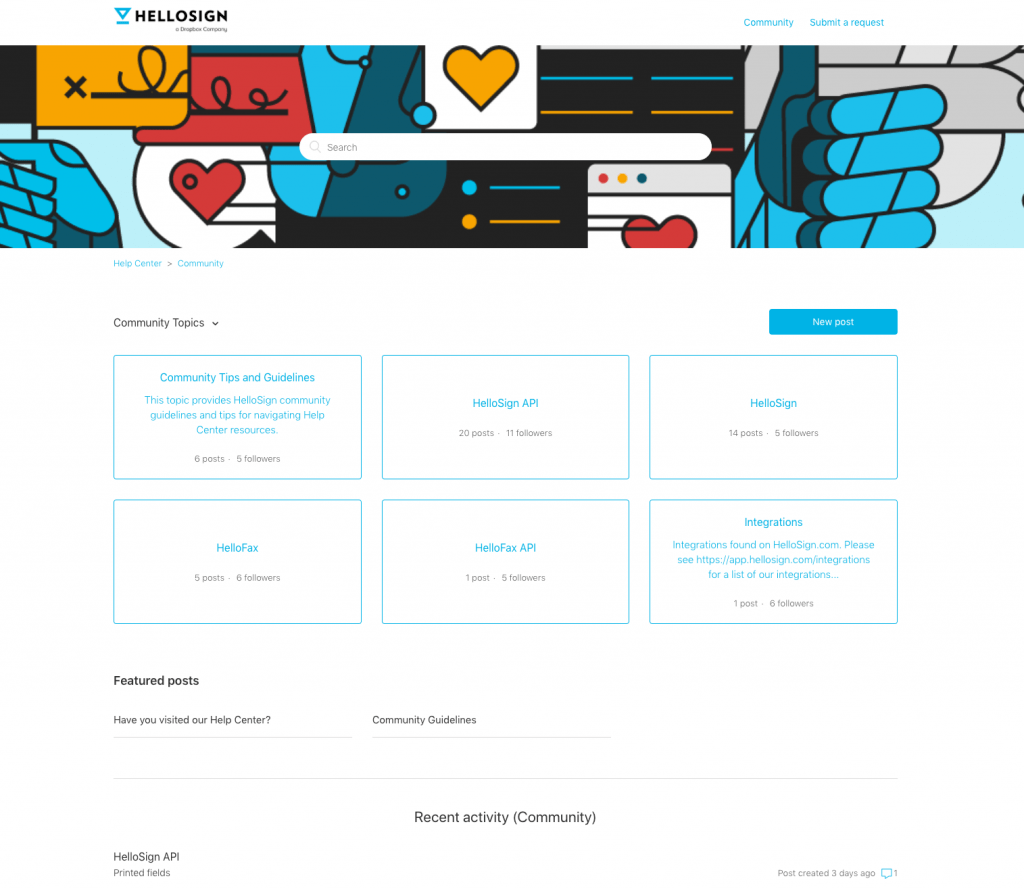
While many organizations would stay focused purely on this existing work, HelloSign has also been eager to explore other types of communities, most notably in skills development of their customers beyond their product.
One of the great examples that I’m really proud of was a thought leadership program we ran all of last year called Digital Strength. The goal of the program was to give everyone within an organization, from the C-Suite to individual contributors, the guidance to better understand and achieve digital transformation (that elusive digital nirvana every company is striving for!). Every month, we delivered a different ‘chapter’ with a live webinar, a white paper, a video and much more, giving people the skills and plans needed to accelerate their own digital journey. Naturally, our intent was to not only be helpful, but to bring people together who share the mission of digital transformation— a community focused on a common goal who can not only benefit from our insights but also from each other.
The program was a huge success, with thousands of participants, 15% of whom were from Fortune 2000 companies. The sheer number of sign-ups was a clear indicator that people were looking to learn from shared experiences.
The program ran in 2018, but is still available to anyone who is interested, offering full access to methods and techniques that can be used to create and measure digital transformation projects.
Lessons Learned
I am always eager to get a sense of what key lessons people such as Whit would pass on to my readers who are pursuing an interest or career in community strategy. She started with the importance of building purpose.
It is important to recognize that community for community’s sake will not be successful. A true community is built off of common interests, missions or goals. True communities often form organically; they are not a quick-fix solution to a weak culture or lack of diversity. Shared experiences, interests and motivations are the elements that create a strong, replenishing community—and often are the same elements that pull like-minded individuals together of their own volition and need. Many nonprofits have grown across generations and dynamic social climates because of people’s passion for their cause.
Across these different communities, Whit has also observed something that many successful organizations love about communities: glueing together a network of minds, packed with experience, ideas, and potential.
I’ve also learned that strong communities are self-perpetuating. They build upon themselves. Members draw from each other, starting a domino effect based on shared attitudes, interests or goals. This creates the potential for mass expansion and growth, especially within communities that value shared experiences and learning. Think about social media platforms that seemingly blew up in popularity overnight, or global movements of individuals gathering in like-minded celebration or protest. ]
Finally, Whit shared that any community, be it internal, focused on partners, or a customer community, needs care and feeding.
It is important to remember that communities need to be nurtured. Some of the healthiest communities I have seen or been a part of have a consistent influx of fresh ideas, new contributions and new members, all of which provide ongoing value and new perspectives for everyone in the community.
Thanks, Whit, and keep up the great work!
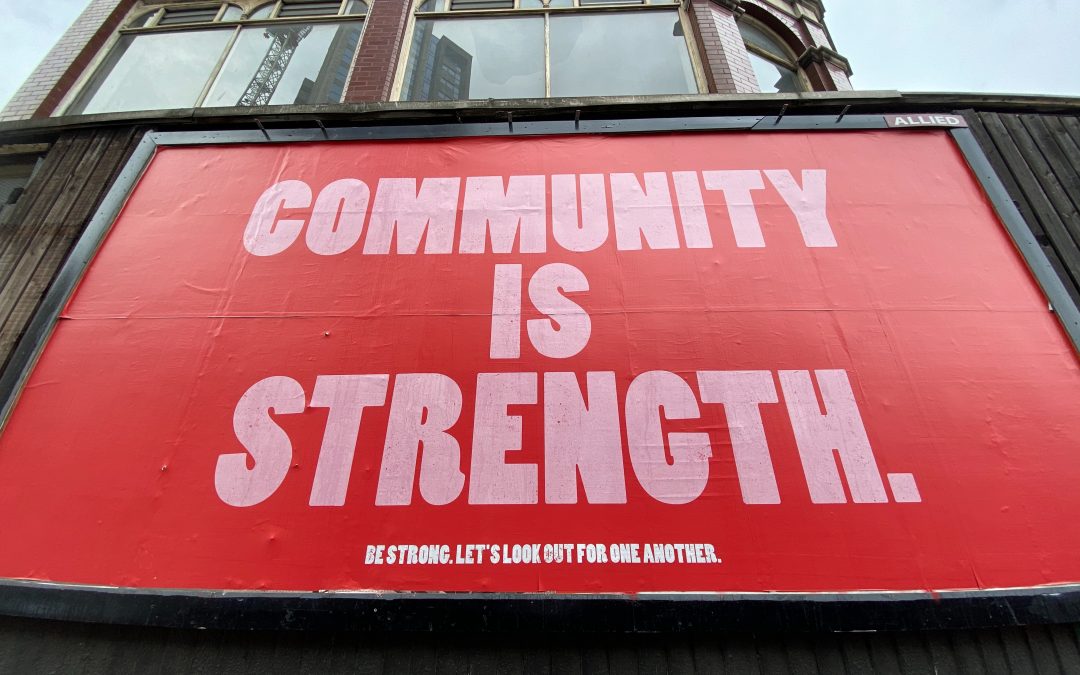
Announcing my new book: ‘People Powered: How communities can supercharge your business, brand, and teams’
I am absolutely thrilled to announce my brand new book, ‘People Powered: How communities can supercharge your business, brand, and teams’ published by HarperCollins Leadership.
It will be available in hard cover, audiobook, and e-book formats, available from Amazon, Audible, Walmart, Target, Google Play, Apple iBooks, Barnes and Noble, and other great retailers.
The book is designed for leaders, founders, marketing and customer success staff, community managers/evangelists, and others who want to build a more productive, more meaningful relationship with your users, customers, and broader audience.
‘People Powered’ covers three key areas:
- The value and potential of building a community inside and outside a business, how it can create a closer relationship with your users and customers, and deliver tangible value such as improved support, technology development, advocacy, and more.
- I present the strategic method that I have used with hundreds of clients and companies I consult with and advise. This guides you how to create a comprehensive, productive, and realistic community strategy that scales up, build cross-departmental skin in the game, create incentives, run events, measure community success, and deliver results.
- Finally, I walk you through how to to integrate this strategy into a business, covering hiring staff, building internal skills and capabilities, measuring this work with a series of concrete maturity models, and much more.
The book covers a comprehensive range of topics within these areas:

The book features a forward from New York Times bestseller Peter Diamandis, founder of XPRIZE and Singularity University.
It also features contributions from Joseph Gordon-Levitt (Emmy-award winning actor), Jim Whitehurst (CEO, Red Hat), Mike Shinoda (Co-Founder, Linkin Park), Ali Velshi (Anchor, MSNBC), Jim Zemlin (Executive Director, The Linux Foundation), Noah Everett (Founder, TwitPic), Alexander van Engelen (Contributor, Fractal Audio Systems), and others.
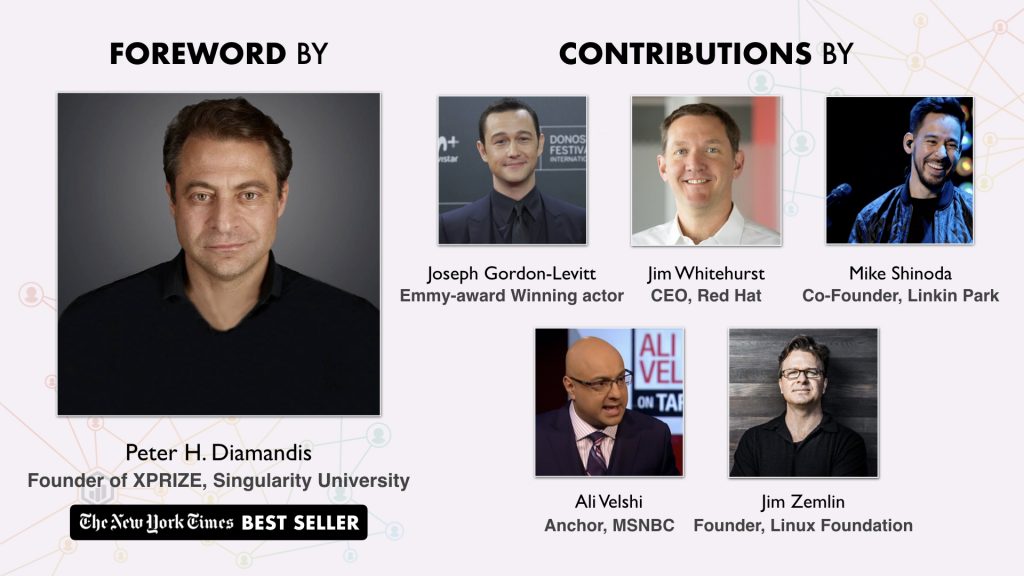
The book has also received a comprehensive range of endorsements, including Nat Friedman (CEO, GitHub), Jim Whitehurst (CEO, Red Hat), Whitney Bouck (COO, HelloSign), Jeff Atwood (Founder, StackOverflow/Discourse), Juan Olaizola (COO, Santander Espana), Jamie Hyneman (Co-Creator and Presenter, Mythbusters), and many others:
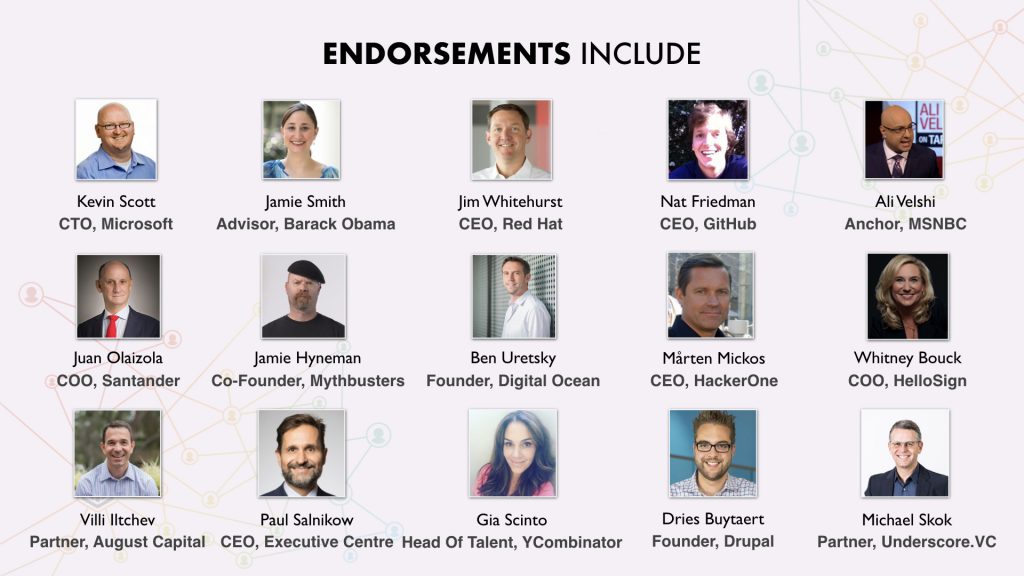
Here are a few sample endorsements:
“If you want to tap into the power that communities can bring to businesses and teams, there is no greater expert than Jono Bacon.”
Nat Friedman, CEO of GitHub
“If you want to unlock the power of collaboration in communities, companies, and teams, Jono should be your tour guide and ‘People Powered’ should be your map.”
Jamie Smith, Former Advisor to President Barack Obama
“If you don’t like herding cats but need to build a community, you need to read ‘People Powered’.”
Jamie Hyneman, Co-Creator/Host of Mythbusters
“In my profession, building networks is all about nurturing relationships for the long term. Jono Bacon has authored the recipe how to do this, and you should follow it.”
Gia Scinto, Head of Talent at YCombinator
“When people who are not under your command or payment eagerly work together towards a greater purpose, you can move mountains. Jono Bacon is one of the most accomplished experts on this, and in this book he tells you how to it’s done.”
Mårten Mickos, CEO of HackerOne
“Community is fundamental to DigitalOcean’s success, and helped us build a much deeper connection with our audience and customers. ‘People Powered’ presents the simple, pragmatic recipe for doing this well.”
Ben Uretsky, Co-Founder of DigitalOcean
“Technology tears down the barriers of collaboration and connects our communities – globally and locally. We need to give all organizations and developers the tools to build and foster this effort. Jono Bacon’s book provides timely insight into what makes us tick as humans, and how to build richer, stronger technology communities together.”
Kevin Scott, CTO of Microsoft
People Powered Preorder Package
‘People Powered’ is released on 12th November 2019 but I would love you wonderful people to preorder the book.
Preordering will give you access to a wide range of perks. This includes early access to half the book, free audio book chapters, an exclusive six-part, 4-hour+ ‘People Powered Plus’ video course, access to a knowledge base with 100+ articles, 2 books, and countless videos, exclusive webinars and Q&As, and sweepstakes for free 1-on-1 consulting workshops.
All of these perks are available just for the price of buying the book, there are no additional costs.
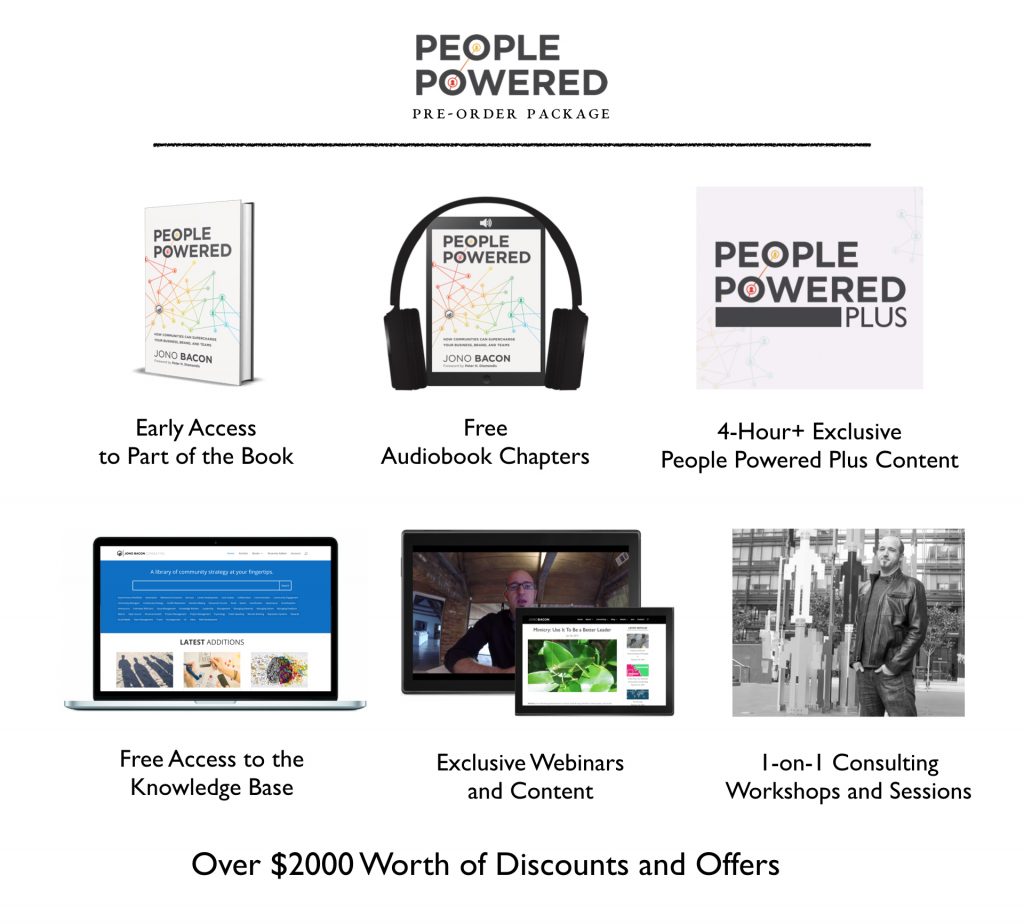
To unlock this preorder package, you simply buy the book, fill in a form with your order number and these perks will be unlocked. Good times!
To find out more about the book and unlock the preorder package, click here

Please Vote! Hack The Network Effect: Customers to Contributors
Just a quick note to you all. I just submitted a session to SXSW in Austin, and there is a community voting component to this. Can you guess what I would I would love you to do?
Yup, to go and vote for it. 🙂
I have never spoken at or been to SXSW, so this would help enormously! It only takes a few minutes, and I would really appreciate your help.
As many of you know, the broader goal of my work is to produce more collaborative, impactful, productive communities at work, at home, and beyond.
My session, Hack The Network Effect: Customers to Contributors, is focused on getting this potential out to the SXSW audience:
Business is changing. Gone are the days of customers passively consuming your product, with little to no interaction beyond occasional support tickets. Consumers want meaningful, connected relationships with the businesses and organizations they love.
The future of business is enabling your customers to not just play an active role in their success, but that of their peers and your brand. Done well, this can builds remarkable brand loyalty, retention, and innovation and reduce costs.
Salesforce, Star Citizen, Random House, HackerOne, Sephora, and others have done it. Now it is your turn.
Jono Bacon, author of ‘People Powered’ by HarperCollins Leadership, presents the combination of psychology, workflow, branding, and technology that delivers this, packed with pragmatic next steps.
The overall focus of the session is to provide an overview of how communities can be powerfully harnessed to build more engaging, more productive relationship between businesses and their customers. My goal is three key takeaways:
- Human beings crave roles in meaningful, impactful communities. Businesses can harness this need to enable customers to channel peer contributions.
- These communities can generate diverse contributions: support, technology, fundraising, advocacy, and more, and careful incentives builds retention.
- Marketing needs modernizing to harness this: social/content is not enough. Peer recognition, social capital, and right relationships are critical.
I would love if you could go and vote for the session (you don’t have to be an attendee of SXSW to vote). It should only take a few minutes:
Thanks! 🙂

Ryan Bethencourt on Growing Sustainable Food, Shark Tank, and Wild Earth
What does bioscience innovation, sustainable pet food, and Shark Tank have in common? Ryan Bethencourt, that’s who.
Ryan is a pretty accomplished guy. He has studied business and biotech, molecular biopharmaceuticals, genetics, and brain tumor angiogenesis at Cambridge, Berkeley, Warwick, Stanford, and Yale. Oh, and he went on Shark Tank and raised $550k from Mark Cuban.
Ryan’s passion for biosciences took him to be an investment partner for Babel Ventures, a $26m fund focused on investing in emerging biotech companies (including Occamz Razor, Nebia, Vitagene, CUE, Forever labs, California Dreamin, Zbiotics and Finless Food) sin Seed and Series A. He is also an advisor to companies and organizations including UCSF Health Hub, Memphis Meats, Berkeley Ultrasound, The Thiel Foundation, Vitro Labs, and many others.
Most recently though, he formed Wild Earth, a company producing sustainably produced pet food. He took his company onto Shark Tank and raised one of the largest amounts for his season. He works weekly with Mark Cuban.
In this episode of Conversations With Bacon we get into how innovation has evolved in biosciences, the role of the credit crunch, the horror show that is the pet food production industry, how Ryan and his team have approached growing better food (and the R&D and more), and where the future of biosciences lies. Oh, and of course, we delve into his experience of going on Shark Tank, behind the scenes, and what it is like to work with Mark Cuban. This is a really fascinating look into what the future of food looks like.

Emily Musil Church on the Global Learning XPRIZE
Back in 2014, I worked at the XPRIZE Foundation, and we launched the Global Learning XPRIZE. This $15 million competition, funded by Elon Musk among others, challenged teams to build an Android tablet application that teaches kids how to read, write, and perform arithmetic, all without the aid of a teacher within 18 months. The competition showed the potential of how technology can help to bring education to 250million+ kids around the world.
Fast forward to 2019 and the prize was awarded to Team onebillion and Team KitKit School, with all entries showing incredible results in learning across literacy, maths, and beyond. What’s more, all the entries have been open sourced on GitHub.
Emily Musil Church is the director of the prize, and was involved at every step of the way from shaping the competition, to running the field trials in Tanzania, and more. She is one of the most incredible people I have ever worked with.
In this episode of Conversations With Bacon we get into the nature of the competition, the logistics of running field trials with thousands of Google Pixel tablets across hundreds of remote villages, how the teams competed and collaborated together, the broader impact of education beyond merely learning, the open sourcing of the entries, and much more. This is a really fascinating and inspiring conversation!

